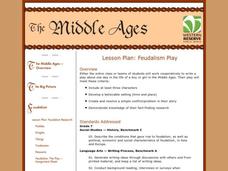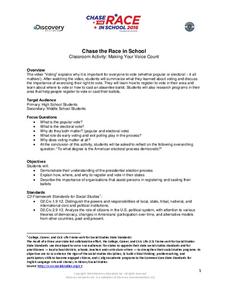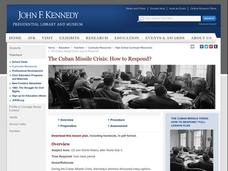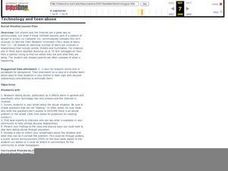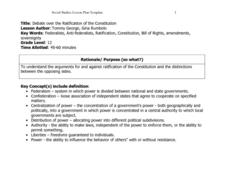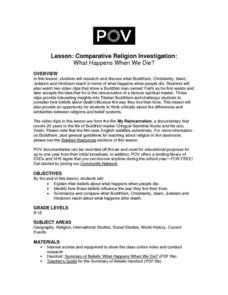Redefining Progress
Have and Have-Not
Is there a correlation between a country's wealth and the extent of its ecological footprint? What exactly constitutes an ecological footprint, and how does one country stack up against the rest? This is a unique lesson to incorporate...
Northeastern Educational Television of Ohio, Inc.
Feudalism Play
Using research notes on feudal roles in medieval Europe, learners work cooperatively to write a play about one day in the life of a boy or girl in the Middle Ages.
Discovery Education
Making Your Voice Count
As learners watch a video on voting, they take notes on a worksheet that lists various voting topics, including electoral and popular votes, early voting, and exit polling. Then, young people research the Internet for their state's...
John F. Kennedy Presidential Library & Museum
The Cuban Missile Crisis: How to Respond?
For 13 days, the United States stood on the edge of nuclear War. The Soviet Arms buildup in Cuba is the focus of an activity that asks groups to analyze how the governmental role each of John F. Kennedy's advisors played went on to...
National Park Service
Civil War to Civil Rights: From Pea Ridge to Central High
Explore how the Civil War impacted the Civil Rights Movement. Class members complete a series of projects for a unit that uses a layered curriculum approach to learning.
American Documentary
American Aloha: Hula Beyond Hawai'i
In this lesson plan, students will examine Hawaii's issues of colonization, authority, authenticity and cultural identity, and understand the distinction between native and non-native Hawaiians. This lesson plan includes links to videos,...
National Endowment for the Humanities
The Strategy of Containment, 1947–1948
How do people stop the spread of an ideology they don't think is right? Scholars research the policy of containment during the start of the Cold War. Small groups analyze primary sources to determine how the United States combated...
Curated OER
What's Legal with Music on the Web?
Student research legalities of downloading music from Internet, gather information on citizens who have been charged with downloading/copyright crimes, find out who is working to create new laws dealing with this technology, explore what...
Curated OER
Technology and Teen Abuse
Students research dating abuse, particularly as it affects teens in general and specifically when technology like cells phones and the Internet is involved. They develop and use a survey on dating abuse in thier school and use the...
Curated OER
October: Respect for Self and Others
Students realize their worth and dignity as human beings and account for their strengths as well as display their weaknesses. They display good manners and politeness, showing the respect for others as they would wish for themselves....
Curated OER
Debate over the Ratification of the Constitution
Twelfth graders discuss the creation of the United States, the Articles of Confederation and the Constitution. Through a class debate, role-playing Federalists and Anti-federalists, they identify the reasons for and against ratification...
Curated OER
Girls Around the World: Communicating Through First-Person Narratives
Teams select a society to investigate and create a chart comparing and contrasting the status of girls in that society with their own. They then craft and illustrate a personal narrative written from the point of view of a girl living in...
Curated OER
A Lesson To Accompany "The First Bank of the United States: A Chapter in the History of Central Banking"
Here is an interesting topic. Learners examine the economics that led to the founding of the First Bank of America. They participate in a reader's theater experience depicting the debate between Alexander Hamilton and Thomas Jefferson...
Curated OER
The Embodied Presidency
Tenth graders compare and contrast the immigration reform policies of Presidents Reagan and Bush. In this immigration instructional activity, 10th graders examine primary documents related to each president's policy for immigration...
Alabama Department of Archives and History
Clotilde, The Last Slave Ship
The Clotilde was the last known ship to bring slaves from Africa to the United States - good riddance! Dive into the details of the ship, its cargo, origin, and route, and learn about the future of the Africans on board with a...
University of Chicago
What IS the Difference Between Sunni and Shi'ite Muslims?
The distinction between Shiite and Sunni Muslims is an often misunderstood concept, yet very important for its implications in global affairs and for a more comprehensive understanding of the religion of Islam.
Pulitzer Center
"Voices from Haiti": Using Poetry to Speak up for a Cause
Explore a real world use of poetry with your class! Young language arts pupils consider the concept of advocacy and how journalism, photography, and poetry can raise awareness for a cause. They read several poems about individuals...
American Documentary
Comparative Religion Investigation: What Happens When We Die?
How do different religions offer explanations for what happens when we die? Invite your learners to consider the variance and complexity of religious beliefs, and to research and compare/contrast the concept of death and afterlife...
NET Foundation for Television
1850-1874 Railroads and Settlement
Have you ever wondered how your town was placed where it is? Scholars research the impact the advancement of the railroad due to the passage of the Kansas-Nebraska Act had on the formation of civilization in the Great Plains. Map...
K20 LEARN
Diversity Quilt: A Lesson on Culture
After brainstorming the various aspects of cultural identity, class members interview each other, examine video clips, and read stories to discover how these aspects reveal one's cultural identity. Individuals then craft a quilt square...
National Endowment for the Humanities
Lesson 4 James Madison: Internal Improvements Balancing Act—Federal/State and Executive/Legislative
Who has the power? The founding fathers asked the same question when the United States was formed. Learners explore issues that arose during Madison’s presidency that raised constitutional questions. Through discovery, discussion, and...
Curated OER
Presidential Speeches
Listen to and analyze a presidential speech in order to explain the principles held by the president and the historical context in which the speech was made. Then hold a campaign and election simulation involving featured presidents.
National Endowment for the Humanities
The Monroe Doctrine: A Close Reading
Students identify specific passages in the Monroe Doctrine to events in early U.S. diplomacy.
Curated OER
The Election Is in the House: 1824: The Candidates and the Issues
Students list some changes in presidential election laws and/or procedures since 1796, and cite examples from presidential campaign materials from 1824.
Other popular searches
- Elementary Social Studies
- Middle School Social Studies
- Social Studies Lesson Plans
- Social Studies Lessons
- Social Studies Activities
- Esl Social Studies
- Social Studies Community
- Social Studies Art
- Social Studies Plan
- Social Studies Concepts
- Social Studies Economics
- Social Studies Map Skills



